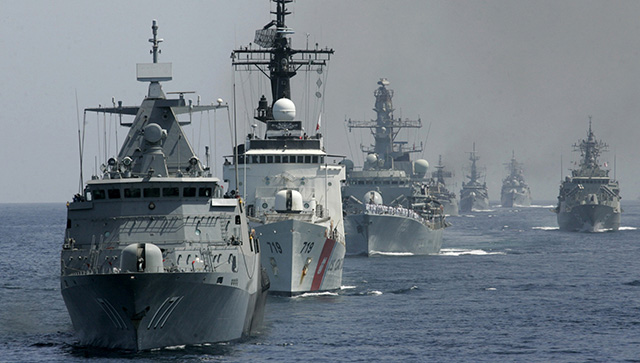In the complex geopolitical landscape of the Indo-Pacific, the alliance between Pakistan and China has taken a military turn, evident in their joint naval exercises. Often referred to as “iron brothers”, the depth of their friendship extends beyond diplomatic ties, with shared military objectives and common goals. The recent Sea Guardians exercise, an annual event with a notable escalation this year, underscores the strategic implications for the region.
The People’s Liberation Army (PLA) of China and the Pakistani military, based in Rawalpindi, share common goals that go beyond traditional military cooperation. Together, they aim to contain Indian influence in the region, create a strategic buffer and pose fresh territorial challenges. Sea Guardians exercise: A manifestation of strategic priorities The Sea Guardians exercise, traditionally held annually, has taken on new significance with its expanded scope. This iteration marks the largest naval drill to date, drawing attention to the strategic manoeuvers involved. China’s contribution includes warships, submarines and guided missile frigates, while Pakistan has committed a substantial naval force, including vessels, helicopters, fighter jets and maritime patrol aircraft. Notably, joint maritime patrols will be conducted, a development closely monitored by New Delhi. The geographical context adds a layer of complexity to the exercises. The drills are taking place at the Karachi Port, near the western coast of India, raising questions about the geopolitical implications of such strategic positioning. Objectives amplified by Chinese media Chinese media outlets are actively amplifying the significance of these drills. They emphasize two key objectives: protecting strategic sea lanes and practicing a joint response to common threats, shedding light on the collaborative military strategies being honed during the exercise. Military tactics: Anti-submarine operations and VBSS The scale of the drills is impressive, encompassing anti-submarine operations and the practice of VBSS (Visit, Board, Search and Seizure). VBSS involves specialised tactics where soldiers learn how to board ships, search them thoroughly, and take control if necessary, showcasing a level of operational depth. Beyond the drills, the exercises highlight an improvement in interoperability between the Chinese and Pakistani navies. Pakistan’s navy, in a significant move, has incorporated more Chinese weaponry, including guided missile frigates received in a recent delivery. Future plans involve the addition of new Chinese submarines, specifically the Hangor-class, enhancing Pakistan’s naval capabilities. The emphasis on high-seas operations indicates a strategic shift in priorities for both Pakistan and China. The joint goal appears to be mounting a significant challenge in the waters of the Indo-Pacific, marking a departure from their traditional regional focus. International response and the Indo-Pacific focus The Sea Guardian exercise follows a significant meeting in New Delhi, where top US officials reaffirmed their commitment to the Indo-Pacific through the 2+2 dialogue. The US Secretary of State emphasized the promotion of a free and open Indo-Pacific, highlighting the importance of maritime domain awareness through partnerships like the QUAD (Quadrilateral Security Dialogue) with Japan and Australia. “We are promoting a free and open, prosperous, secure and resilient Indo-Pacific, including by sprinting our partnership through the QUAD with Japan and Australia. One significant way we’re doing that is by enhancing maritime domain awareness, sharing commercial satellite data with countries in the region to boost their capacity,” said US Secretary of State Antony Blinken. As China and Pakistan expand their naval activities, particularly through the Sea Guardians exercise, the Indo-Pacific region finds itself under heightened scrutiny. The need for constant vigilance becomes imperative for India and its allies, reinforcing the delicate geopolitical balance in this strategically vital part of the world. The evolving dynamics in the Indo-Pacific underscore the significance of collaborative efforts and strategic foresight in navigating the complex waters of international relations. Views expressed in the above piece are personal and solely that of the author. They do not necessarily reflect Firstpost’s views. Read all the Latest News , Trending News , Cricket News , Bollywood News , India News and Entertainment News here. Follow us on Facebook, Twitter and Instagram.


)

)
)
)
)
)
)
)
)



